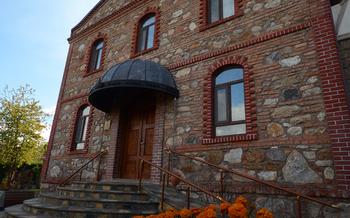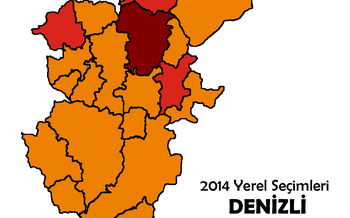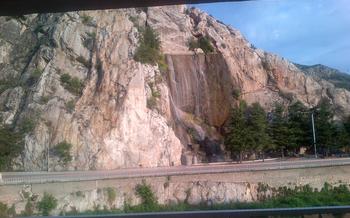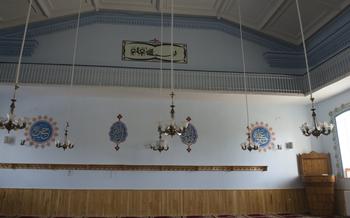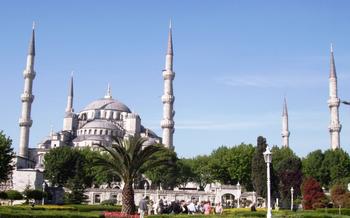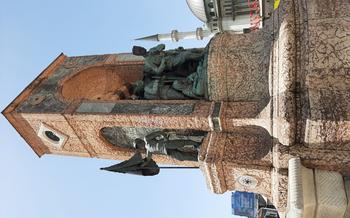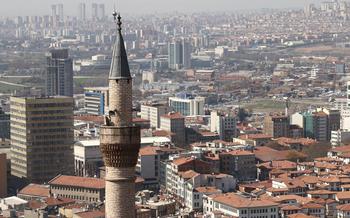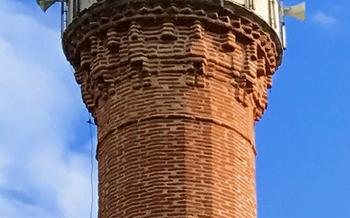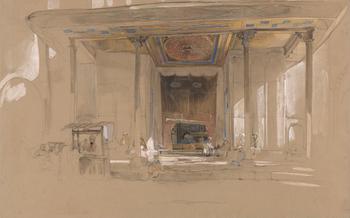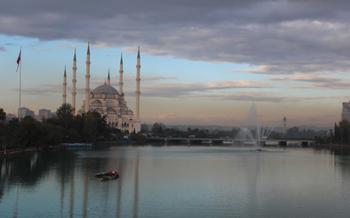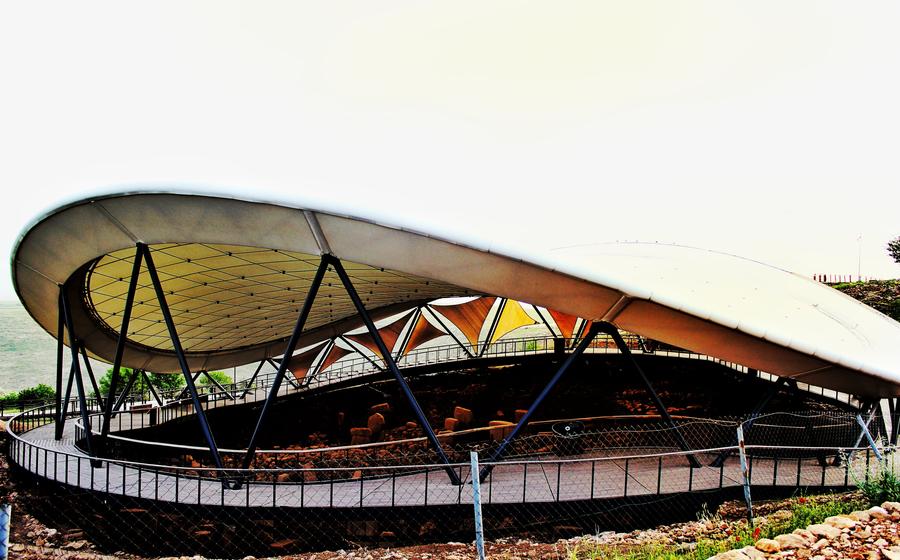
Bediüzzaman Said Nursi Museum
- About Bediüzzaman Said Nursi Museum:
- Explore the Museum's Unique Architecture
- Witness Nursi's Humble Living Quarters
- Discover Nursi's Theological Works
- Immerse in Nursi's Calligraphy and Art
- Learn About Nursi's Life Journey
- Gain Insights into Nursi's Teachings
- Experience Interactive Multimedia Displays
- Attend Special Events and Workshops
- Purchase Souvenirs and Publications
- Engage in Thought-Provoking Discussions
- Appreciate the Serenity of the Museum Grounds
- Plan a Pilgrimage to Nursi's Tomb
- Insider Tip: Unveiling the Secrets of a Serene Sanctuary
About Bediüzzaman Said Nursi Museum:
The Bediüzzaman Said Nursi Museum, located in the historic city of Şanlıurfa, Turkey, is a must-visit destination for anyone interested in Islamic theology, history, and culture. Dedicated to the life and works of the renowned Islamic scholar and theologian Bediüzzaman Said Nursi, this museum offers a unique glimpse into the life and teachings of one of the most influential figures in modern Islamic thought.
Established in 1986, the museum is housed in a beautifully restored traditional Ottoman-style building, reflecting the architectural heritage of the region. It is situated in the heart of Şanlıurfa, within walking distance of the city's other historical and cultural attractions. The museum is open to visitors throughout the year, with a modest admission fee.
The Bediüzzaman Said Nursi Museum holds immense significance for Muslims worldwide, particularly those following the teachings of Nursi. It serves as a repository of his works, personal belongings, and artifacts, providing visitors with an opportunity to learn about his life, contributions, and enduring legacy.
Explore the Museum's Unique Architecture
The Bediüzzaman Said Nursi Museum is housed in a magnificent building that seamlessly blends traditional Islamic architecture with modern design elements. The exterior of the museum commands attention with its intricate geometric patterns, elegant arches, and towering minarets. These architectural features draw inspiration from the rich history and cultural heritage of the region.
Upon entering the museum, visitors are greeted by a spacious and light-filled interior. The building's layout is designed to evoke a sense of serenity and contemplation, with wide corridors and open spaces. Natural light floods the museum through large windows, creating a harmonious atmosphere that enhances the visitor experience.
The museum's architecture is not merely decorative but also carries symbolic and spiritual meanings. The geometric patterns and motifs found throughout the building represent various aspects of Islamic beliefs and traditions. These intricate designs serve as reminders of the interconnectedness of all things and the unity within diversity.
The harmonious blend of traditional and modern elements in the museum's architecture reflects Nursi's own approach to Islamic thought. He sought to bridge the gap between tradition and modernity, emphasizing the compatibility of faith and reason. The museum's architecture embodies this vision, creating a space that is both rooted in history and relevant to the contemporary world.
Witness Nursi's Humble Living Quarters
The Bediüzzaman Said Nursi Museum offers a unique glimpse into Nursi's personal life and daily routine through the display of his humble living quarters. Here, visitors can witness the simplicity and austerity with which he lived, reflecting his devotion to scholarship and spiritual pursuits. The room where he resided is preserved as it was during his lifetime, showcasing his modest belongings and the tools he used for writing and contemplation.
The significance of Nursi's living space lies in its representation of his ascetic lifestyle and his focus on the inner journey. Visitors can appreciate the stark contrast between the grandeur of the museum's architecture and the simplicity of his living quarters, emphasizing his detachment from worldly possessions. The artifacts and belongings on display, such as his writing desk, prayer rug, and personal items, provide a tangible connection to his daily life and the challenges he faced.
Discover Nursi's Theological Works
Bediüzzaman Said Nursi was a prolific writer and scholar whose theological works have had a profound impact on Islamic thought and spirituality. The Bediüzzaman Said Nursi Museum houses a significant collection of Nursi's writings, including the renowned Risale-i Nur Collection.
The Risale-i Nur Collection is a comprehensive set of treatises that cover a wide range of Islamic topics, including theology, philosophy, ethics, and social issues. Nursi's unique approach to Islamic theology emphasizes the harmony of faith and reason, the importance of unity and brotherhood among Muslims, and the need for interfaith dialogue and understanding.
Through his writings, Nursi aimed to revive Islamic thought and spirituality in a time of great social and political upheaval. He sought to provide a rational and contemporary interpretation of Islam that would resonate with both traditional scholars and modern-day seekers.
The Risale-i Nur Collection has been translated into dozens of languages and has gained a global following among Muslims and non-Muslims alike. It is considered a seminal work in modern Islamic thought and continues to inspire and guide millions of people around the world.
Immerse in Nursi's Calligraphy and Art
Bediüzzaman Said Nursi was not only a prolific writer but also a talented calligrapher and artist. His artistic creations, infused with spiritual and symbolic meaning, offer a unique glimpse into his inner world and his connection to the divine.
The Bediüzzaman Said Nursi Museum showcases a collection of Nursi's calligraphy and paintings, providing visitors with an opportunity to appreciate his artistic prowess. His calligraphy, characterized by its intricate and elegant script, reflects his profound understanding of the Arabic language and its sacred significance.
Through his artworks, Nursi sought to convey deep spiritual messages and illuminate the beauty and harmony of the universe. His paintings, often featuring abstract forms and vibrant colors, evoke a sense of transcendence and invite viewers to contemplate the mysteries of existence.
By exploring Nursi's calligraphy and art, visitors gain a deeper appreciation for his multifaceted personality and his ability to express complex ideas through multiple mediums. His artistic creations serve as a testament to the interconnectedness of faith, reason, and beauty in his life and teachings.
Learn About Nursi's Life Journey
Bediüzzaman Said Nursi's life was a remarkable journey marked by profound spiritual insights, tireless scholarship, and unwavering dedication to the revival of Islamic thought. Born in 1876 in Nurs, Eastern Anatolia, Nursi displayed an extraordinary aptitude for learning from a young age. He embarked on a quest for knowledge, studying Islamic sciences, philosophy, and modern sciences.
Nursi's spiritual awakening came during his time in Damascus, where he experienced a profound encounter with the divine. This experience transformed his life, leading him to devote himself to the renewal of Islamic thought and the purification of society. He returned to Turkey and began to share his insights, attracting a vast following of students and admirers.
Nursi's contributions to the Ottoman Empire and later the Turkish Republic were significant. He played a crucial role in the preservation of Islamic identity during a period of intense secularization. His writings and teachings provided a beacon of hope and guidance for Muslims seeking to reconcile their faith with the challenges of modernity.
However, Nursi's path was not without its trials and tribulations. He faced numerous challenges and persecutions throughout his life. He was imprisoned on several occasions, and his works were banned by the authorities. Despite these hardships, Nursi remained steadfast in his mission, enduring adversity with remarkable resilience and unwavering faith.
Gain Insights into Nursi's Teachings
Bediüzzaman Said Nursi was not only a prolific writer but also a profound thinker and teacher. His teachings encompass a wide range of topics, including theology, philosophy, ethics, and spirituality. At the heart of his teachings lies the belief in the unity and oneness of God. Nursi emphasized the importance of faith, reason, and unity in Islam, advocating for a harmonious coexistence between religion and science.
One of the central themes in Nursi's teachings is the concept of "iman-ı tahkiki" or "investigative faith." He encouraged Muslims to engage in deep contemplation and critical thinking to strengthen their faith. Nursi believed that true faith should be based on reason and evidence, rather than blind acceptance.
Another key aspect of Nursi's teachings is his emphasis on interfaith dialogue and understanding. He promoted the idea of "universal brotherhood" among all people, regardless of their religious or cultural differences. Nursi believed that Muslims should strive to build bridges of understanding with people of other faiths, fostering cooperation and harmony.
Nursi's teachings have had a profound impact on millions of people around the world. His writings continue to be studied and revered by Muslims and non-Muslims alike, inspiring generations to seek knowledge, embrace reason, and strive for a deeper understanding of the divine.
Experience Interactive Multimedia Displays
The Bediüzzaman Said Nursi Museum embraces technology to create an immersive and engaging experience for visitors. Interactive exhibits and multimedia presentations bring Nursi's teachings and life to life. Visitors can engage with touchscreens, virtual reality experiences, and audio-visual displays that provide a deeper understanding of his works and their significance. These interactive elements enhance the museum's educational value, allowing visitors to explore Nursi's ideas in a dynamic and memorable way.
Attend Special Events and Workshops
The Bediüzzaman Said Nursi Museum offers a rich calendar of events and workshops throughout the year, providing visitors with opportunities for deeper learning and spiritual growth. These events are designed to engage participants in interactive discussions, workshops, and lectures on a variety of topics related to Nursi's teachings and Islamic thought.
The museum regularly hosts conferences, seminars, and workshops led by scholars, experts, and practitioners in the field of Islamic studies. These events delve into specific aspects of Nursi's theology, philosophy, and contributions to Islamic thought. Participants can engage in thought-provoking discussions, ask questions, and gain insights from renowned experts in the field.
The museum also organizes special workshops and programs that focus on practical applications of Nursi's teachings in daily life. These workshops may cover topics such as mindfulness, meditation, interfaith dialogue, and ethical decision-making. Participants can learn how to apply Nursi's principles to their personal lives and develop a deeper understanding of their own spiritual journeys.
By attending these events and workshops, visitors can immerse themselves in the teachings of Bediüzzaman Said Nursi, connect with like-minded individuals, and embark on a journey of personal growth and spiritual development. The museum provides a platform for ongoing learning, reflection, and the exchange of ideas, fostering a vibrant community of Nursi's followers and admirers.
Purchase Souvenirs and Publications
The Bediüzzaman Said Nursi Museum offers a well-stocked gift shop where visitors can purchase a variety of souvenirs and publications related to Nursi and his teachings. These items serve as tangible mementos of your visit and can help you continue your exploration of his legacy.
Among the offerings are books and pamphlets that delve deeper into Nursi's writings, providing additional insights and perspectives on his theological and philosophical ideas. These publications range from introductory texts to more in-depth scholarly works, catering to visitors with varying levels of knowledge and interest.
The gift shop also features unique souvenirs such as prayer beads, calligraphy art prints, and decorative items inspired by Nursi's teachings. These items are not only aesthetically pleasing but also carry symbolic and spiritual significance, making them cherished keepsakes for visitors.
Whether you seek to expand your understanding of Nursi's teachings or simply wish to take home a tangible reminder of your visit, the museum's gift shop offers a diverse selection of items to meet your needs.
Engage in Thought-Provoking Discussions
The Bediüzzaman Said Nursi Museum is not just a place to learn about Nursi's life and teachings; it also serves as a platform for dialogue and discussion. Visitors are encouraged to engage with fellow visitors, share their insights, and explore different perspectives on Nursi's teachings and their relevance to contemporary issues.
The museum regularly hosts seminars, workshops, and conferences that bring together scholars, experts, and interested individuals to discuss various aspects of Nursi's life and work. These events provide a unique opportunity to engage in thought-provoking discussions, ask questions, and gain a deeper understanding of Nursi's teachings.
The open and welcoming atmosphere of the museum fosters critical thinking and self-reflection. Visitors are encouraged to challenge their own assumptions, question their beliefs, and explore new ideas. The museum's collection, exhibitions, and events provide a rich foundation for intellectual and spiritual growth.
Whether you are a scholar, a student, or simply someone interested in exploring new perspectives, the Bediüzzaman Said Nursi Museum offers a vibrant and intellectually stimulating environment where you can engage in thought-provoking discussions and broaden your understanding of Islam and the world we live in.
Appreciate the Serenity of the Museum Grounds
The Bediüzzaman Said Nursi Museum is not merely a place of historical and theological significance; it also offers visitors a tranquil haven amidst the bustling city. The museum's grounds are meticulously landscaped, creating an atmosphere of peace and serenity that invites contemplation and reflection. Visitors can stroll through the gardens, surrounded by lush greenery, colorful flowers, and the gentle sound of water features. The serene environment provides the perfect setting to pause, reflect on Nursi's teachings, and connect with one's spiritual side. Whether seeking a moment of respite from the city's hustle and bustle or a space for deep contemplation, the museum's grounds offer a sanctuary for visitors to find solace and tranquility.
Plan a Pilgrimage to Nursi's Tomb
A visit to the Bediüzzaman Said Nursi Museum is incomplete without paying homage to Nursi's final resting place. Located in the city of Şanlıurfa, the tomb of this revered Islamic scholar and thinker holds immense spiritual significance for his followers and visitors alike.
Nursi's tomb is situated in a serene and tranquil setting, surrounded by lush gardens and a peaceful atmosphere. The tomb itself is a simple yet elegant structure, reflecting Nursi's humble and ascetic lifestyle. Visitors can approach the tomb, offer prayers, and seek blessings from this great spiritual leader.
The pilgrimage to Nursi's tomb is not merely a visit to a historical site; it is an opportunity for spiritual reflection, contemplation, and seeking guidance. Many visitors find solace and inspiration at the tomb, connecting with Nursi's legacy and teachings on a deeper level.
Whether you are a devout follower or simply someone curious about Nursi's life and work, a visit to his tomb is a meaningful and enriching experience. It is a chance to honor his contributions to Islamic thought and spirituality, and to seek blessings and guidance from one of the most influential figures in modern Islamic history.
Insider Tip: Unveiling the Secrets of a Serene Sanctuary
To fully embrace the tranquility and spiritual essence of the Bediüzzaman Said Nursi Museum, consider visiting during the early morning hours or on weekdays when the crowds are fewer. This serene atmosphere allows for a more intimate and contemplative experience, enabling you to connect deeply with Nursi's teachings and immerse yourself in the museum's sacred ambiance.
When visiting the museum and tomb, it is essential to dress modestly and respectfully, adhering to local customs and traditions. This demonstrates your reverence for the site and its significance to the Muslim community.
To gain a deeper understanding of Nursi's life and teachings, take advantage of the museum's guided tours. These informative sessions, led by knowledgeable guides, provide insights into Nursi's profound impact on Islamic thought and his contributions to promoting peace and unity. By participating in these tours, you will leave the museum with a richer appreciation for Nursi's legacy and its enduring relevance in the modern world.
